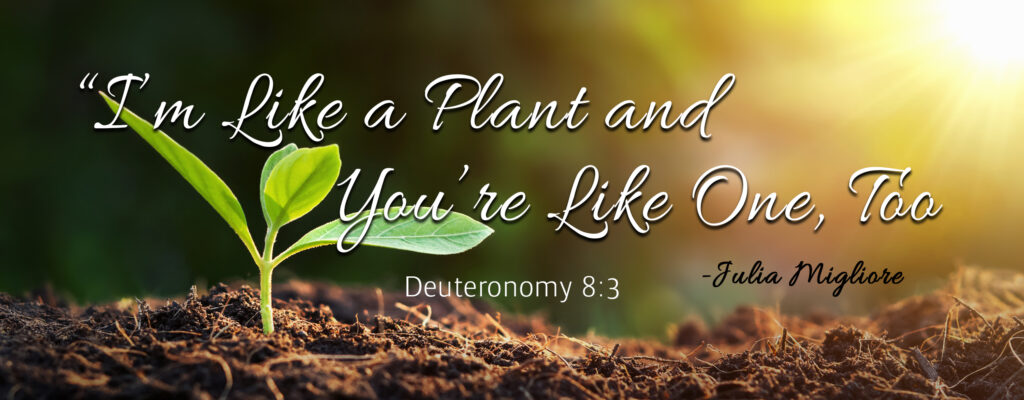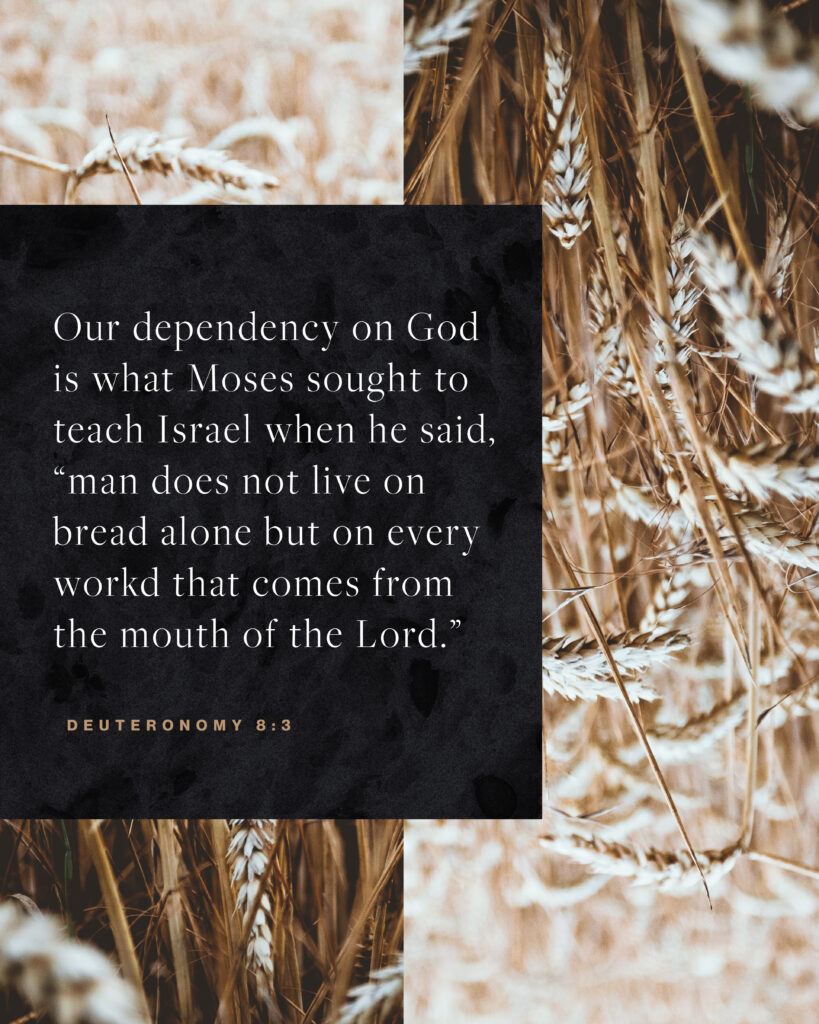19 Oct I’m Like a Plant and You’re Like One, Too

What does a plant need to live? It needs sunlight, water, carbon dioxide, nitrogen-rich soil. A plant with all of its resources may feel pretty confident in life. But the truth is, the plant’s possession of these things has very little to do with the plant’s efforts.
Sure, the plant has interesting and efficient systems to collect energy from sunlight, to gather water, to harvest carbon dioxide, and to acquire nitrogen. Nevertheless, the plant could never place itself as a seedling into a good spot with appropriate access to sunlight, water, clean air, and nutrients in the soil. The plant is fully dependent on situations outside of its control to live and to thrive. You could even say that the plant was fully dependent on God to design it with the ability to collect the resources it needs.
In these ways, I’m like a plant. And you’re like one, too.
Our dependency on God is what Moses sought to teach Israel when he said, “man does not live on bread alone but on every word that comes from the mouth of the Lord.” (from Deuteronomy 8:3)
I’ve seen this verse cited frequently by people advocating for daily, personal Bible study. The message? We need God’s word (that is, the Bible) to thrive in this life. This is entirely true… but it fails to capture the fullness of what Moses was trying to communicate when he said this. “Every word that comes from the mouth of the Lord” includes more than just the canonized scriptures; it includes those that resulted in the creation of the world. Surely man cannot live on bread alone, because everything that sustains life was created and placed and is now sustained by the words of God. To see this, we have to zoom-out and get some context.

The book of Deuteronomy documents a big speech from Moses as Israel was about to cross the Jordan river after forty years in the wilderness and enter the rich, fruitful land God promised to them. At this point, Moses has been told he will die before the rest of Israel gets to the promised land, so this is somewhat of a farewell speech for him. He desperately wants Israel to remember the character of God (his power, his goodness, his faithfulness), to remember his special relationship with Israel (the chosen nation, his provision, how he dwells with them), and to let these things motivate them to love God and work hard to keep his commandments.
Specifically in chapter 8 of Deuteronomy, Israel was petitioned to remember that God was the one to sustain them in the wilderness. When they get to the promised land and food is abundant, Israel needs to remember that this abundance is not of their own doing. They need to attribute this abundance and fruitfulness to God.
This is the whole of verse 3:
“He humbled you by letting you go hungry; then he gave you manna to eat, which you and your ancestors had not known, so that you might learn that man does not live on bread alone but on every word that comes from the mouth of the Lord.” (CSB)
Before speaking about “bread alone,” Moses specifically recalls a time in the wilderness when Israel was hungry and complained, but God provided manna for them to eat (recorded in Exodus 16). Moses explains that God allowed Israel to struggle a bit before providing “so that [they] might learn.” This should position us to read the rest of the verse as the lesson related to this humbling experience.
So what is the lesson? I would argue that the lesson is one in humility and dependence on God.
First, “man does not live on bread alone.” We are prone to think that life will be okay as long as our needs are met. A lot of the time, we are capable of meeting our own needs, and in these cases, why rely on God? The belief that “bread alone” is all we need will lead us to the belief that we are entirely responsible for our own thriving. (Moses foresaw this and warned against it later in verse 17, saying “beware, lest you say in your heart, ‘My power and the might of my hand have gotten me this wealth.'”)
Any of our successes, our “bread” or “sunlight” or “water,” still depend on the circumstances God has put us in and the abilities God has given us.
“But man lives by every word that comes from the mouth of the Lord.” These includes God’s commandments to Israel (that is, the Law), as Moses argues that obedience will lead to blessing and life, while disobedience will lead to curses and death. However, it also includes God’s commandments to the world. By his word, God created all things (Genesis 1) and by his word, God holds power over all things. What God says, goes! He communicates this ever-so succinctly through the prophet Isaiah, saying “so my word that comes from my mouth will not return to me empty, but it will accomplish what I please and will prosper in what I send it to do.” (Isaiah 55:11)
Simply put, we are just not as independent as we think we are. God’s authority–his word–determines if we eat or starve, if we find our way or remain lost, if we grow or remain stagnant, if we live or die. We can live because the Lord permits it by the time and place he plants us. Any of our successes, our “bread” or “sunlight” or “water,” still depend on the circumstances God has put us in and the abilities God has given us.
God orchestrated my life in such a way that I was able to do everything I have ever done. He even designed my brain to be able to learn and think and problem-solve. Not even the workings of my own mind are independent of God’s authority in the world!
Recently, I completed all the work required for a master’s degree. Others have been quick to congratulate me for this work too and it would be easy for me to grab the praise and build my pride with it. But the truth is, I did not put myself in graduate school. I did not provide for myself the background I needed to be successful. I did not give myself the support of a husband or the encouragement of friends or even the money to buy groceries and pay the bills while in school. God orchestrated my life in such a way that I was able to do everything I have ever done. He even designed my brain to be able to learn and think and problem-solve. Not even the workings of my own mind are independent of God’s authority in the world! I am no more responsible for my academic accomplishments than a plant is responsible for being planted in a place with good sunlight and fertile soil. I have to remember the times that God has humbled me and depend on him for all my life. Next time you see Deuteronomy 8:3, join me in reflecting on the authority and sovereignty of God in your life. Think of a time when God let you struggle before he came through and thank him for the lesson. Praise his great and ultimate authority over the universe. Rejoice in his provision and his faithfulness, past and future, because you’re like a plant. And I’m like one, too.



